I’m on a quest to catch a fish in each of the 50 U.S. states – and to use each adventure as a means to explore conservation, the latest fisheries research and our complicated connections to the natural world.
I stared at the hole in the ice, twitching my rod slowly, every couple of seconds. I’d give the jig a little bounce, let it flutter back down to the end of my line, then repeat.
I have written many times that when I’m fishing, it’s just me, the water and the fish. I’m focused. Nothing else exists. It turns out, I was quite wrong. I learned this sitting in an ice shanty on Sturgeon Bay, Wisconsin.
The “ice shanty” was essentially a spartan cabin on ice. It was heated and had bench seats. But it was literally me, the fish (hopefully) and a hole in the ice. I should have been in my glory. Instead, I felt bored and claustrophobic. I had the realization, jigging my rod while staring into an icy water realm, that I am not as focused as I think when fishing. I look at birds. I take a minute to watch a mink hunting or admire a patch of wildflowers. I listen to the sounds of the river. I may be focused, but what’s happening around me matters.
I stared at bare walls surrounding me. I gazed into the hole in the ice. I tried to understand the sonar fish finder. It was supposed to tell me when a fish was near, but I just saw indecipherable blips and colors.
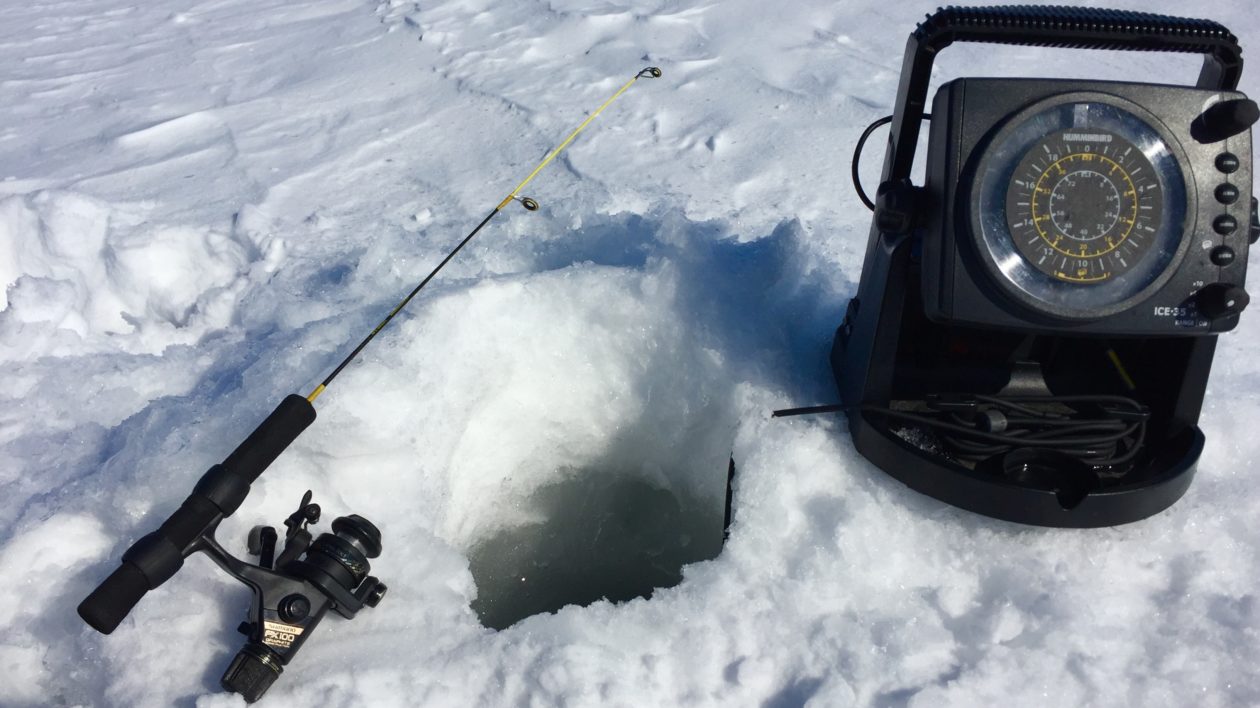
I felt like I was fishing indoors, a strange concept. I was later joined in this shanty, a rental owned by a local guide, by another angler. He jigged his own rod and told me that some ice shanties had televisions. You could watch the Packers and catch fish at the same time. I didn’t quite know what to make of this information.
I continued staring. And then. A twitch? Barely perceptible, but a little bump on my rod. I lifted the rod, and felt a weight, then a fighting fish. The little ice fishing rod bent over, and I began reeling.
The rod seemed too small for the task, but within a minute I pulled my first lake whitefish through the ice. Not a big one, but a beautiful, native fish. Enough to keep me going in the ice shanty.
A few minutes later, a more solid thump. I set the hook and began reeling. The fish took line; I tightened the drag. Soon, I landed it, a larger and plumper fish.
“Now that’s a better whitefish,” my ice shanty companion said.
He took a few steps over to me to admire the fish. We bumped into each other. He began sharing whitefish stories, our breath mingling in the confines of the ice shanty. There was not anything particularly unusual about any of this. Except it was February 2020. I could not imagine how strange being this close to a stranger, in a confined space, would seem in a few short weeks.
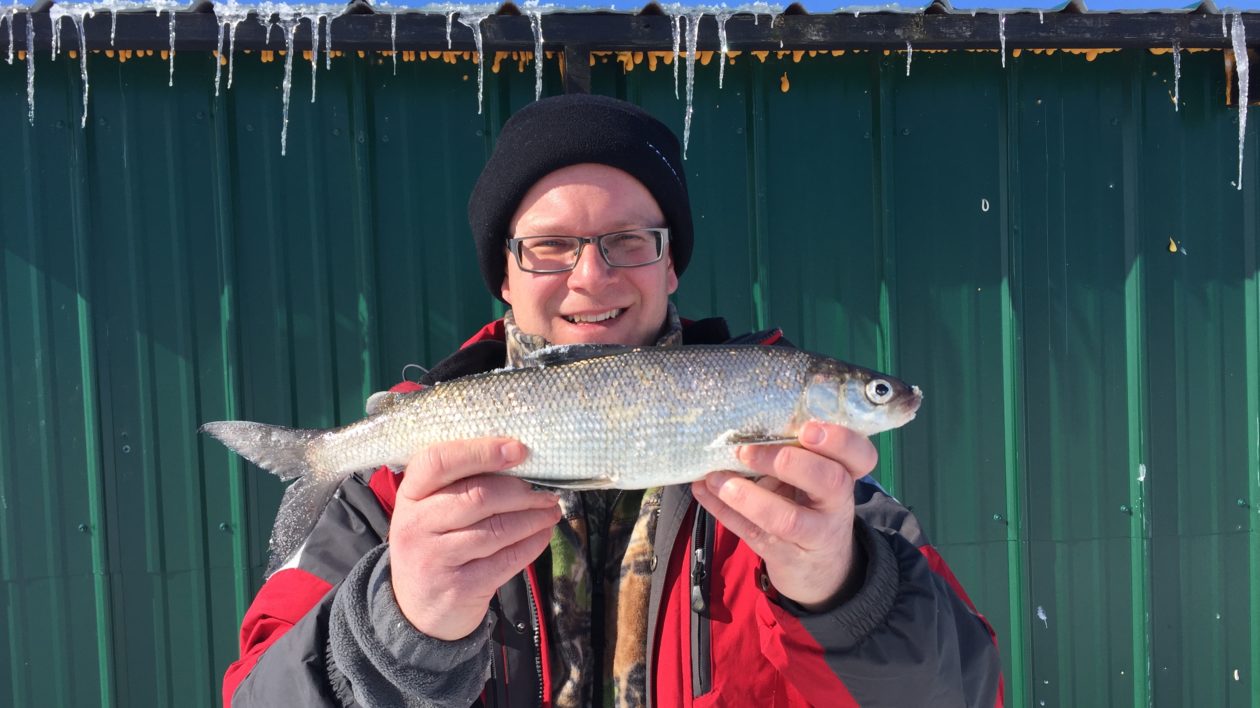
February 2020
You think back to February 2020 and it seems a very long time ago. Even routine things. I found myself in Wisconsin that month not primarily to ice fish, but to give a keynote presentation to the Wisconsin Wetlands Association conference. Then I traveled an hour away to spend the weekend with my wife’s sister Sandy and her family.
We did what you might consider the normal family stuff. My in-laws joined us and we had nice dinners. My nephews Jacob and Jack beat me in pool at a local pizza joint. I went to Jack’s high school basketball tournament, sitting in a crowded high school gym. We attended an opening night movie, in an equally crowded theater. Driving back to Madison for the flight home, I stopped for a craft beer and meal at a local microbrewery.
I have not done any of these seemingly “normal” activities since.
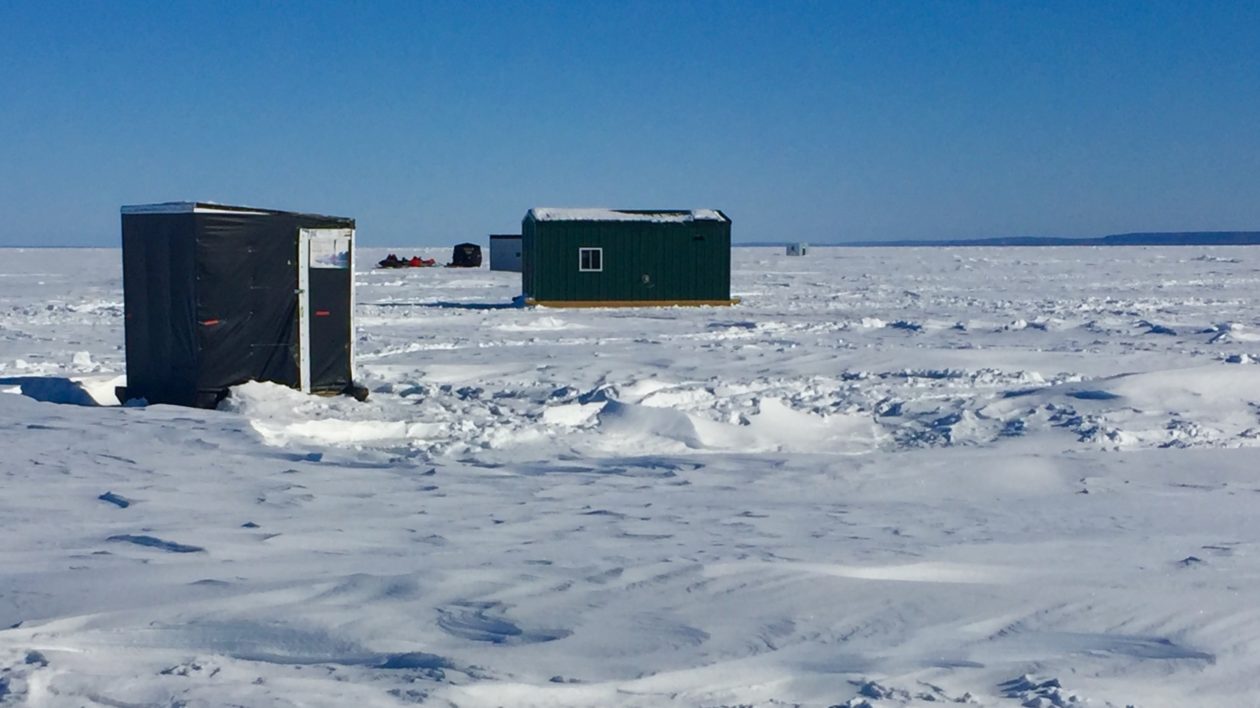
When I got home, I sat down to write what I thought was a straightforward story about lake whitefish in Sturgeon and Green bays. By then, though, the story no longer seemed like something I could write. Sitting in quarantine, trying to write about whitefish, all I could think about was high-fiving my nephews over a billiards table, the kind of carefree interaction we just assumed would always be there. And it pained me in a way that perhaps defies explanation. Or maybe you’ve felt it, too.
I’ve had an easier quarantine than most but at times it has been a mental struggle of ups and downs. I’ve had joyous moments with my wife and young son, tempered by missing my parents and brother. I have seen my son blossom with his own interests and sense of humor, but worry about his safety. About virtual kindergarten. I have watched neighbors embrace conspiracy theories. I’ve felt unsafe and angry and despondent.
And perhaps more so when I realize there is no magic moment when we flip the switch and go back to the way things were. And here my thoughts turn back to the Great Lakes, to whitefish and to the impossibility of turning back clocks.
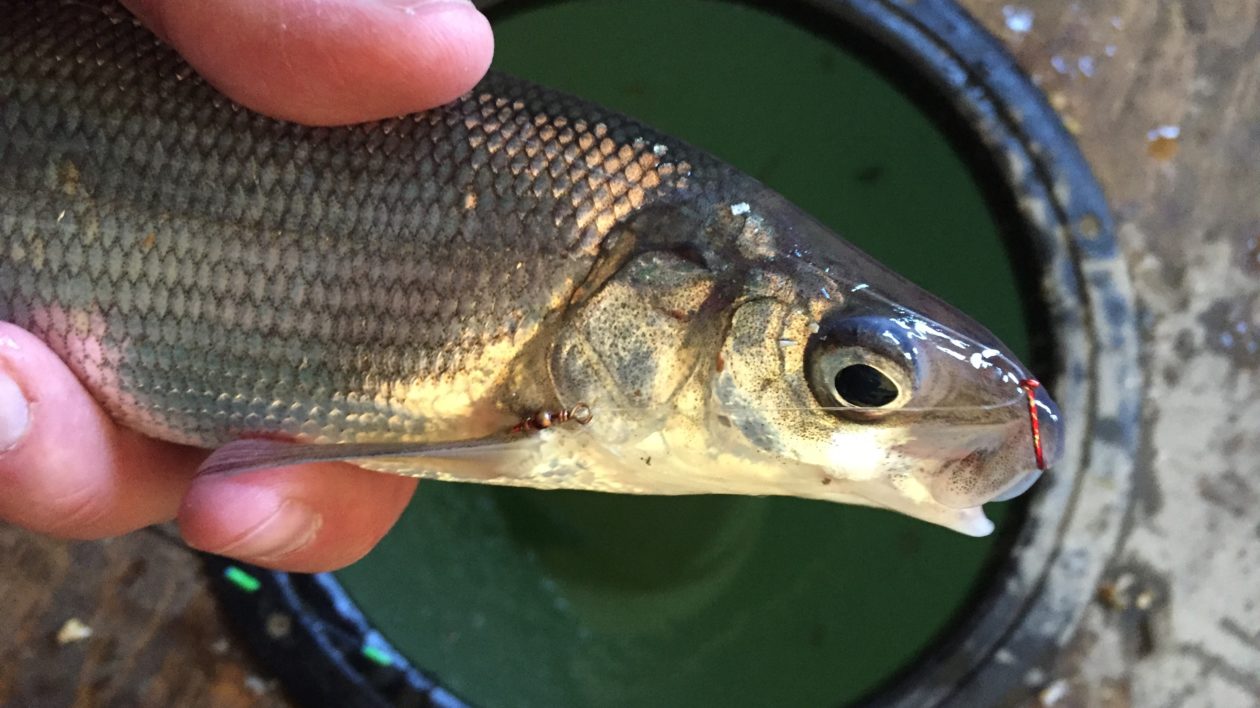
Whitefish and Shifting Baselines
Zach Burgess, a Sturgeon Bay fishing guide, invited me to fish for whitefish. I took a morning away from the conference to visit. We rode out onto the ice on an ATV with tracks instead of tires. As we zipped across the ice, wooden ice houses appeared all around, like a little town on ice, all focused on catching whitefish.
Ten years ago, Burgess told me, he would have never guessed he would have a winter business devoted to whitefish. That’s because no one here caught them. Burgess attributes this to a booming population of invasive round gobies. He believes that the lake whitefish shifted from their usual deep water haunts to shallower waters, where ice fishers can more easily target them. Research suggests that there are more complicated factors, with other factors like habitat at play.
I caught 8 lake whitefish on Sturgeon Bay, but in many parts of Lake Michigan and Lake Huron these fish are difficult to find. Whitefish in both lakes are down about 50 percent from a decade ago.
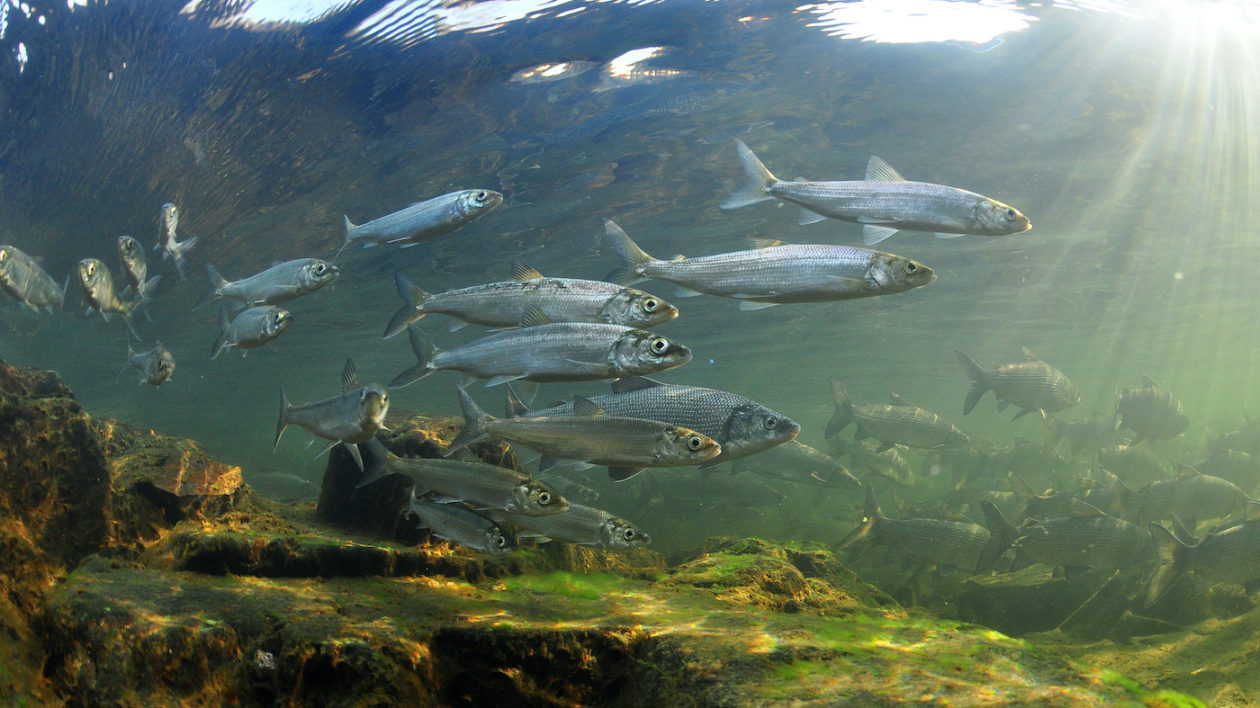
The recent history of the Great Lakes is filled with complicated and interconnecting ecological stories. There is no “normal.” Once, Lake Michigan teemed with native lake trout, lake herring and lake whitefish, supporting viable commercial fisheries well into the mid-1900s. It all seemed inexhaustible – but, of course, that was an illusion.
Around 1960, the lake herring population crashed – the victim of the triple whammy of overfishing, habitat degradation and invasive species.
Lake herring were not just an important commercial species, they also fed lake trout. After the herring population crash, the lake trout switched diets to non-native alewives. Lake trout need thiamine to produce viable eggs, but alewives have an enzyme that causes thiamine to break down. The diet switch thus was a poor substitute, kind of like replacing your vegetable intake with potato chips.
And so, as went the lake herring so went the lake trout. In fact, for many years, lake trout lacked meaningful levels of reproduction.
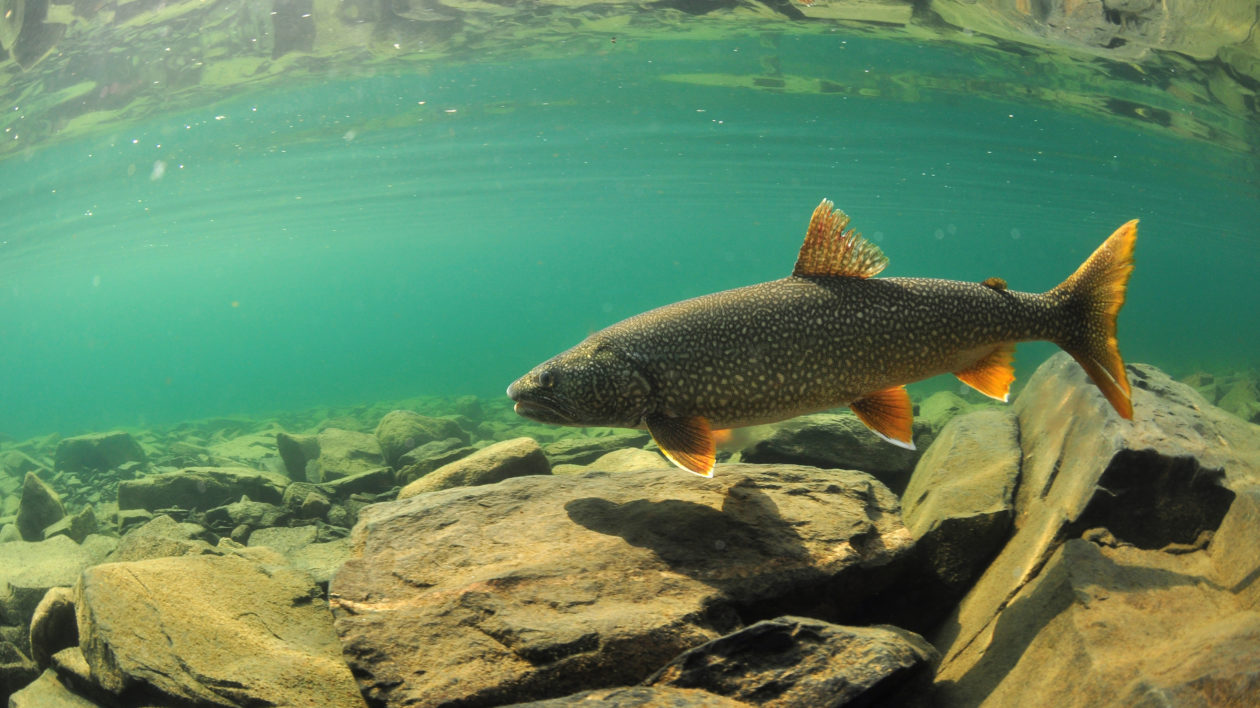
The alewives instead were gobbled by coho and chinook salmon, species introduced on purpose for sportfishing. I visited Traverse City, Michigan, in 1998 to fish with a friend. We trolled the cloudy waters and caught a lot of salmon.
I returned 15 years later, and my Nature Conservancy colleague Matt Herbert took me snorkeling. More changes. The water was no longer cloudy – thanks in part to zebra mussels, another invasive species. The invasive alewife population had by this time crashed, and I talked to local anglers bemoaning the associated loss of salmon. While snorkeling, we saw a number of impressive smallmouth bass. Their population had boomed, because they were eating the invasive gobies.
The invasive gobies (and another non-native species, rusty crayfish) were feasting on the eggs of remnant lake trout.
And so it goes, this endlessly complex series of changes caused by wave after wave of invasive species, habitat degradation, pollution, climate change.
In my travels in this region, I often am asked by friendly locals what I’m doing. When I talk about conservation, they’ll often say something like “The lakes are so messed up I’m not sure why anyone even bothers.” There’s an assumption embedded in this sentiment. It’s the idea that conserving the Great Lakes means turning back the clock. Returning conditions to an imagined more “pristine” time.
It is an assumption that is actually encouraged by much conservation rhetoric. Even The Nature Conservancy once had as its slogan “Protecting living museums of primeval nature.” It implies that restoration has the ability to transport an ecosystem back to a better time.
There is no going back, of course. The changes are so complex and ongoing, it’s an impossibility. The Great Lakes conservationists I talk to have emphasized that returning to a pristine state is not the goal. It’s shaping a future where people and nature can both thrive here. It’s a recognition that an ecosystem with abundant native species is more resilient in the face of inevitable changes. It’s a recognition that a healthy ecosystem provides better for the people who live and work there. It’s not about looking back. There will be choices, sometimes hard ones. Sometimes expensive ones. But we can still help shape the Great Lakes we want.
It’s an imperfect metaphor, but perhaps that’s how we face our own future as we continue to grapple with a pandemic. We will not be turning back the clock. But we have choices: choices that double down on bad ideas, or choices that shape a better, more equitable society.
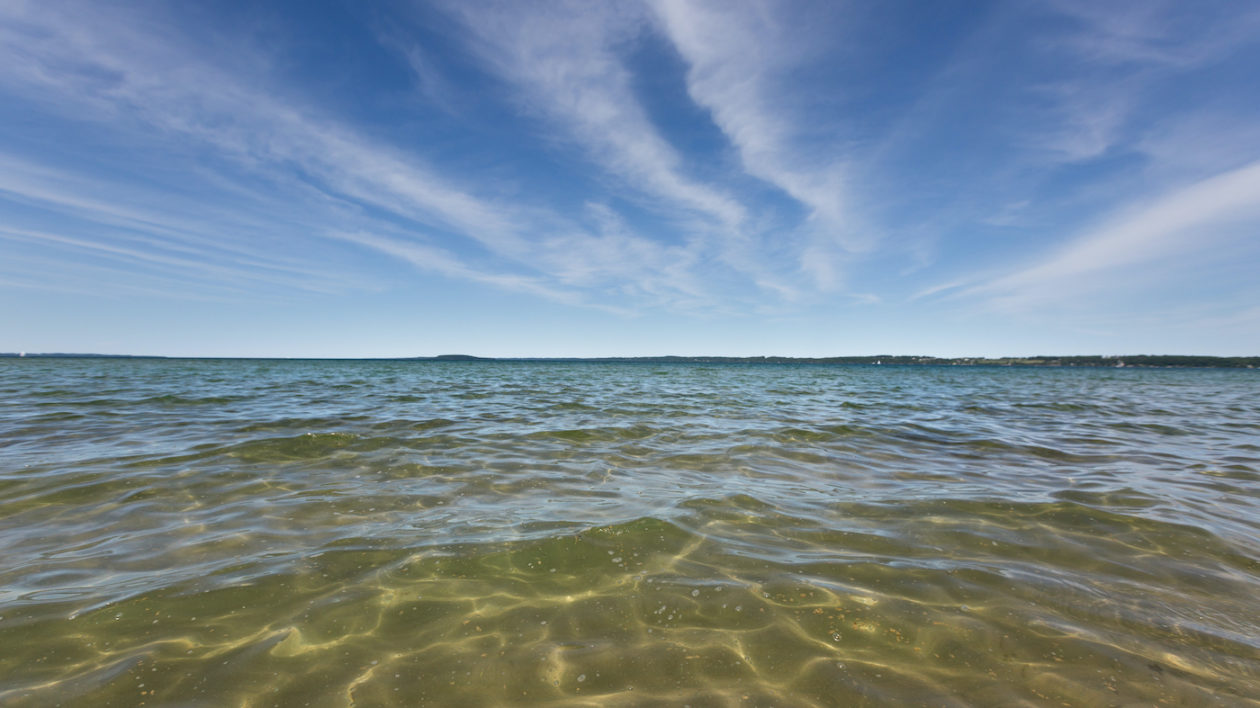
Frozen in Time
As I think back to Wisconsin, my best memories are not of sitting in an ice shanty, but of sitting outside on a 4-degree Fahrenheit morning with my nephew, Jacob.
Jacob was 19, and we’ve had our share of icy adventures over the years. When he was younger, we had a tradition where we’d play what I called barnyard basketball. The court was an icy concrete slab on my in-laws’ farm, surrounded by firewood, the odd farm implement and other tripping hazards. On frigid Iowa January days, we’d play for four, five hours at a time. Numb hands, bloody noses and bruises were all part of the fun.
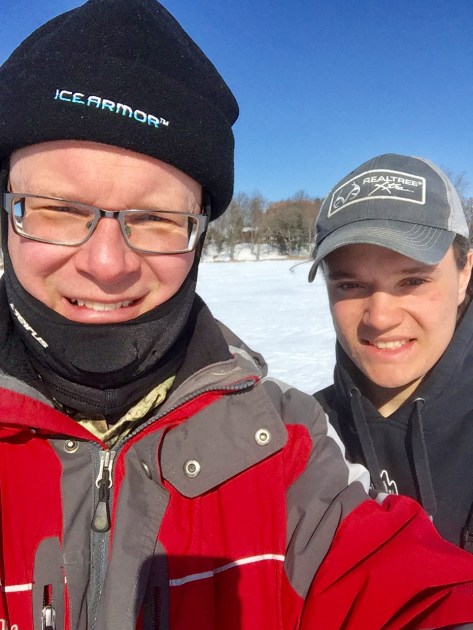
By comparison, ice fishing almost felt luxurious. Almost. Our first morning, Jacob drove his pick-up out onto the ice of Lake Winnebago, with “roads” plowed into the snow. There was a fishing contest in progress, but I had no interest in that, so we pulled away from the crowd and found our own spot.
We had little tents to break the wind, but mainly we sat outside, telling stories, remembering those epic basketball games, talking about fish and school and whatever else came to mind. We’d get up and jump around to try to warm up. I felt a bite and was soon fighting a spunky fish. As I got it close to the surface, the line broke. I plunged my hand into the water, pulling up a white sucker.
Jacob started to apologize that it was “only a sucker,” then caught himself. “I know you love suckers,” he said with a laugh. I do. And as I always say, every fish is a gift. Especially when the moment is shared with people you care about.
We stuck it out for another couple of hours. I felt like a human popsicle. And then Jacob said it. “We better get back for lunch.”
We kept fishing a bit more. We both love fishing, and even in those conditions, well, you try to freeze time.
One more cast. You know you can’t stay out there forever. Linger a moment, take it all in, then walk across towards a new day.
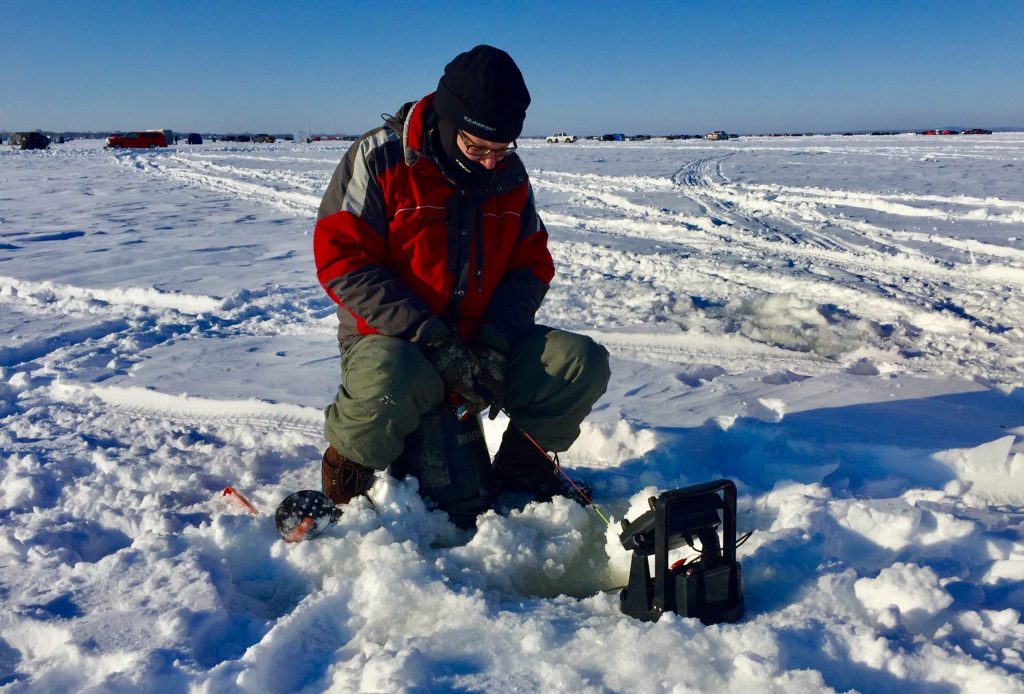



“There is no going back, of course. The changes are so complex and ongoing, it’s an impossibility. The Great Lakes conservationists I talk to have emphasized that returning to a pristine state is not the goal. It’s shaping a future where people and nature can both thrive here”. An important point? Nature is no longer in charge, survival of the fittest has been replaced with designing fisheries for netting profits. Green Bay perch can be kept by netters at 7.5 inches. Lake Michigan perch of 10 inches were as scarce as hens teeth when netters were active, they targeted 8.5-9 inch perch. After quota made large breeding perch economic, it took just 2 years to wipe them off of WI reefs? (see commercial fishing data base, mesh size) . Netting shifted surviving perch to mostly male and smaller on average (see study). After nets were pulled, perch got bigger, shifted to female, just not enough perch left to repopulate the lake. Netting targets the fastest growing fish, removing their genetics forever. Without nets, one can talk of ‘where people and nature can both thrive’, with nets, we can only talk of ‘managed fisheries’, just like managed forests which are subject to (basically) unrestrained logging. History shows the most valuable fish are always removed from the lake first, what’s left is not what nature wants, it what the netters don’t want or can’t have(via laws) !
The greatest competitor to sport fishermen and sport businesses around Green Bay are the nets. More whitefish & perch have been removed from GB by nets than hook and line. The economic impact for a sport caught fish is 10x-40x greater than for a netted fish. You stated “the victim of the triple whammy of overfishing, habitat degradation and invasive species”. Perch eat gobies, crayfish, spiny water fleas, white fish eat invasive mussels, burbot eat gobies. Yet Wisconsin sportsmen are forced to pay netting costs to remove fish worth 10x+ more if left in the lake to be sport caught, or to control invasives (unknown economic value). Science is nice, but economics is useful too, losing money on every valuable fish netted (and killed incidentally) is beyond stupid. Quota system is a giant failure. CanAm perch sting, netting large perch before the spawn, netting ‘accidents’ like, Oct. 2001 saw ~37,500 Lake Michigan yellow perch caught in just 48 hours in gill nets set for chubs, or a number equal to 31% of WI’s estimated Lake Michigan sport perch harvest for the entire year. The public lost 15 days (still in effect) from their ~90 day sport perch fishing season and the last hope of a perch recovery off Milwaukee died with those 37,500 prime breeding size perch.
The politics of nets, still has a major effect on fisheries. GB perch numbers went up when net footage went down, and back down when net usage went back up. The WI DNR never honored their promise to reduce commercial lake trout limit to help restore that fishery, the $1.4 million was paid to netters but the limit was raised not lowered. See https://docs.legis.wisconsin.gov/code/misc/chr/lrb_scanned/cr_96_098_final_rule_filed_with_lrb.pdf
Check out the Wis. Conservation Congress (WCC) meeting minutes, every resolution seeking to limit, reduce or eliminate any Great Lakes commercial fishing has since 2009 died in WCC committee or the WDNR via the use of lies and or discrimination. It seems a special interest group of around 30 individuals, with only about 10 making a lot more than poverty level earnings from netting have more political pull than sports groups and environmental groups, why?
Yes, memories made while fishing are great, it’s a shame kids today can’t do the same because of politics, money and the silence of science and sport groups claiming to represent sportsmen.
Mr. Miller, how many more fish would Green Bay produce if all the millions of feet of State Licensed net were removed from it, forever? The over demand of trees for industry finally led to tree farms, the need for fish is now leading to fish farms, with perch a prime target. Why are public trees protected from harmful industry but not public fish? Who is willing to tell the truth, tell the kid you’re fishing with, he can’t catch as many fish, or bigger fish because it’s more important some netter gets more fish instead along with some of their sport license money. And ask why taking sport license money to pay for commercial costs while being illegal, doesn’t make the news or discussion?
“One more cast. You know you can’t stay out there forever. Linger a moment, take it all in, then walk across towards a new day”. Nice description, have you seen the breakwaters of Lake Michigan especially SE WI, they have been deserted for decades, with the perch fishery being decimated by 1996 and the WDNR and USFWS unwilling to stock perch again, why? Politics! Is a shame young people of SE WI, today and tomorrow will never be able to relate to your ‘one more cast’.
I love your writing, it is always interesting. And I don’t even appreciate fishing… I do appreciate relationships and you have a valuable one with your nephew! May it continue
Hi Joanne,
Many thanks for the comment. I am glad you enjoy my writing.
Cheers,
Matt
I enjoy your writings Matthew. We think along the same lines in regards to fishing. I can’t wait for your book to come out. You ARE going to write a book on your fishing musings, aren’t you?? Please.
Hi Greg,
Thanks for your kind comment. In fact, I already have written a fishing book: Fishing Through the Apocalypse: An Angler’s Adventures in the 21st Century, published by Lyons Press.
Best regards,
Matt
Hello, Matthew–
Thanks again for your thoughtful takes on, well, everything. I love your stories, and also that each one has a deeper context you’re willing to share. You make me think about fish in places I’ve never been (ice fishing–nope, just too darn cold)!
Hi Barbara,
Many thanks for your kind comment. I greatly appreciate it.
Best,
Matt